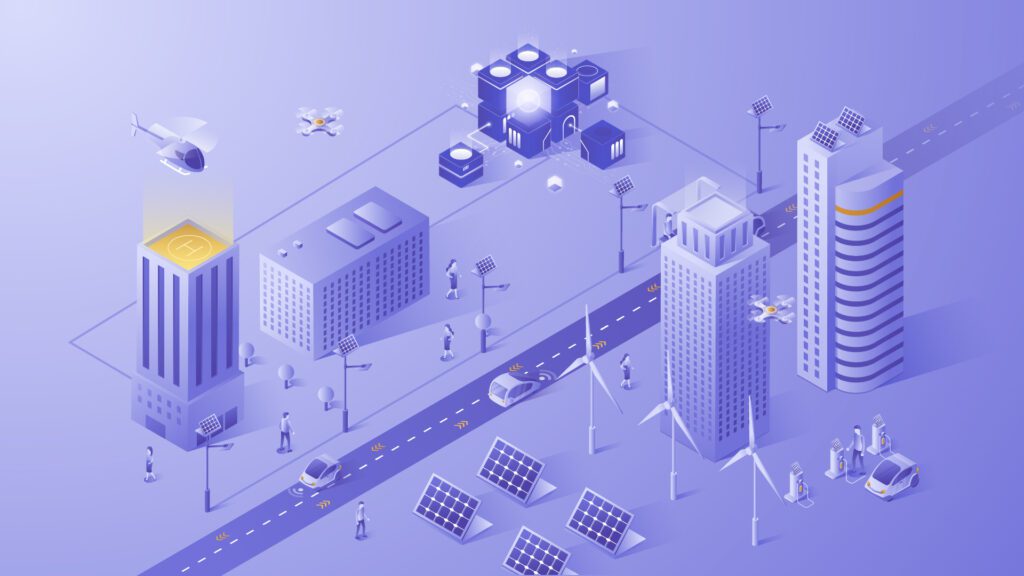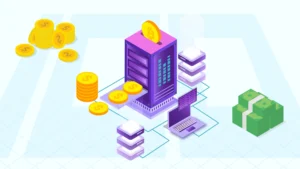
Why Smart Cities Need Blockchain?
Cities around the world are being forced to become more intelligent, efficient, and ecologically friendly due to the world’s fast urbanization. Smart cities are developing now thanks to technologies like blockchain, artificial intelligence, and the Internet of Things (IoT). Among these, blockchain is essential for developing decentralized, transparent, and safe systems for traffic and energy management. Blockchain has the potential to transform how cities operate by removing middlemen and facilitating real-time data sharing.
We’ll look at how blockchain-powered smart cities are changing traffic and energy management in this blog, as well as the reasons why companies and governments are embracing this revolutionary technology.
The Role of Blockchain in Smart Cities
Smart cities function on an integrated digital framework capable of processing vast quantities of data from sensors, mobility systems, and energy grids. Blockchain guarantees –
- Transparency: Immutable records document the production, distribution and use of energy.
- Security: Decentralized systems reduce the risks of cyberattacks on critical infrastructure.
- Efficiency: Peer-to-peer networks eliminate the need for intermediaries, making processes easier.
- Trust: Secure, vetted, tamper-proof data produce trust for citizens and businesses.
These attributes enable blockchain to be the backbone of modern urban systems.
Blockchain in Energy Systems
Energy represents a significant challenge for urban development. Traditional energy grids are centralized, susceptible to failures, and often inefficient. Blockchain technology introduces an opportunity to establish a decentralized energy market that can empower individuals to distribute and consume energy in a smarter way.
- Peer-to-Peer Energy Trading
Homes equipped with solar panels may directly sell excess energy to neighboring homes, using blockchain smart contracts, while reducing reliance on the central grid and supporting renewables.
- Real-Time Energy Monitoring
Blockchain records provide a transparent view of how much every house, industry, or city is consuming, so citizens know exactly from where their energy is generated and how much it costs.
- Renewable Energy Certificates
Blockchain provides the opportunity to digitize renewable energy certificates, making them traceable and easily traded, allowing consumers and enterprises to verify if their sustainability efforts are validated and are accepted worldwide.
Example: The Brooklyn Microgrid Project has enabled residents to directly trade solar energy with each other using blockchain technology. This has improved the efficiency of the local energy system while addressing energy ownership on a community level.
Blockchain in Traffic Systems
Every year, millions of hours and resources are wasted due to urban traffic congestion. Blockchain provides a novel method for controlling mobility services and traffic flow.
- Smart Vehicle-to-Infrastructure
IoT-enabled automobiles exchange traffic information on blockchain, giving authorities real-time route optimization and congestion reduction capabilities.
- Transparent Public Transportation
Blockchain-enabled ticketing reduces fraud, expedites payments, and enhances travelers’ overall commuter experience.
- Autonomous Vehicle Coordination
Blockchain technology is used by self-driving cars to share reliable information, guaranteeing safe communication and lowering the chance of collisions.
For instance, blockchain is incorporated into Dubai’s transportation systems as part of its Smart City 2021 vision, facilitating easier toll payments, digital car registrations, and traffic monitoring.
Benefits of Blockchain-Powered Smart Cities
- Reduced Costs: Peer-to-peer models in energy and traffic cut expenses and improve efficiency.
- Greater Sustainability: Encourages renewable energy use while reducing carbon emissions.
- Data Security: Safeguards critical city infrastructure from hacks and cyber threats.
- Trust in Governance: Transparent records build citizen confidence in public services.
Challenges to Consider
Despite the enormous promise of blockchain, it has challenges in its application in smart cities:
- Scalability: It’s still difficult to handle millions of real-time transactions.
- Interoperability: Blockchain technology needs to interface seamlessly with AI and IoT systems.
- Regulation & Policy: To safely implement blockchain, cities must have clear regulations.
- High Costs: Establishing blockchain infrastructure requires a significant financial outlay.
Ultimately, addressing these challenges will dictate the level of adoption among cities around the globe.
Building the Cities of Tomorrow
Future smart cities will rely not only on digital technologies but also on how well they work together. Blockchain development platforms will be essential to the support of these massive systems as energy grids, driverless cars, and public services become interconnected. Blockchain is a key technology for future-ready urban environments because of its capacity to scale safely, manage enormous data volumes, and facilitate decentralized operations.
Ready to Explore Blockchain for Smarter Cities?
Blockchain technology is only beginning to transform traffic and energy systems. Innovative companies, governments, and entrepreneurs have a rare chance to create cities that are more intelligent, environmentally friendly, and productive.
Now is the perfect moment to investigate how blockchain technology can transform the infrastructure of your city. Blockchain is the secret to urban innovation, from easing traffic to facilitating the use of renewable energy.







